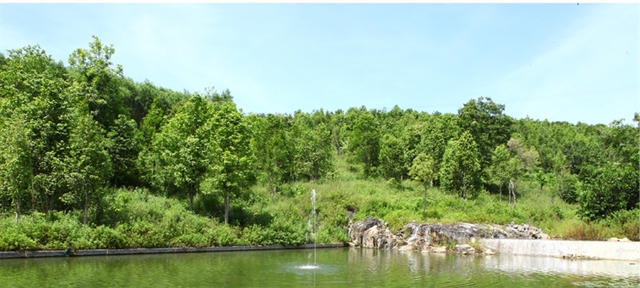 Sunday/Weekend
Sunday/Weekend

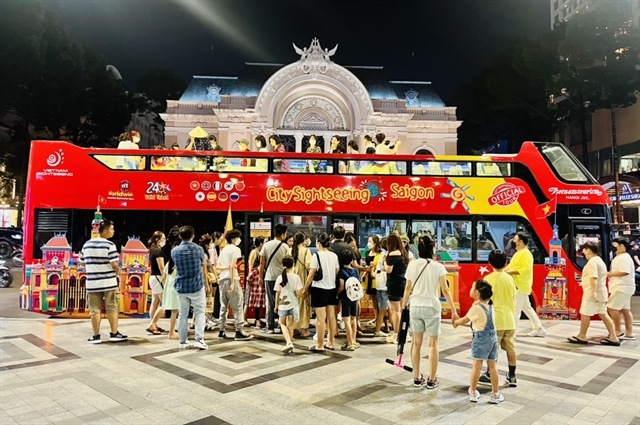 |
| Local and foreign tourists line up for a hop-on and hop-off double-decker bus tour at night. VNS Photo Bồ Xuân Hiệp |
Bồ Xuân Hiệp
Once the sun sets, Bùi Viện and Phạm Ngũ Lão streets, a popular backpacker area in downtown HCM City, are lined with tightly packed bars, where tourists come for fresh beer, great finger food, loud music and fun.
A Thai tourist from tourism mecca Bangkok told me, “The night scene here is awesome.” This area is equivalent to Khao San Road area in the Thai capital.
"It’s worth a try if you are travelling with a group of friends," he added. There are great bars, clubs and restaurants that serve all kinds of food through the night.
If you are looking for a romantic moment, why not take an evening dinner cruise down the Sài Gòn River to escape from the honking vehicles of the busy city.
There could be a sumptuous feast, live jazz performances, fire dancing, and gorgeous night views to make the night memorable.
If dining along the city streets is your cup of tea, you will find many stalls scattered around the city.
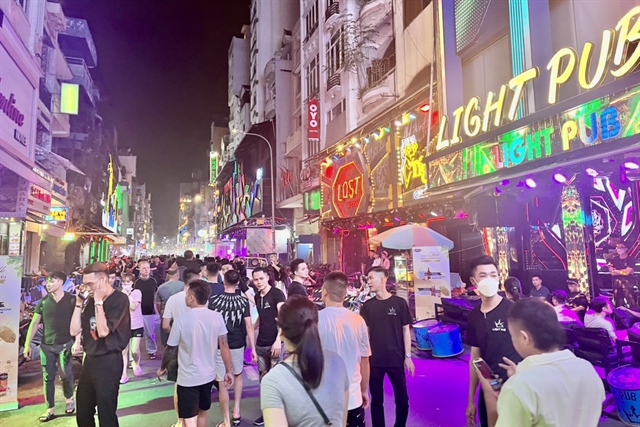 |
| Local and foreign tourists at the popular Bùi Viện ‘backpacker street’ in downtown HCM City. VNS Photo Bồ Xuân Hiệp |
Locals love sitting on the pavement and enjoying a bowl of hot soup or dish of rice after a day of hard work. And it will cost you a dollar or so.
No specific plans for what to do at night? Just wander aimlessly around town as walking around the city seems to be the best way to get around, especially at night.
Night tourism development
Matt Ryan, co-founder of the Indika Saigon bar in District 1, said HCM City had a great deal of night life, with many places for local residents and visitors to spend time in.
More nighttime services would help extend tourists’ length of stay and spending in HCM City, he said.
Many travel agencies also said tourists were excited to try out the nightlife in the city, especially foreigners whose home country time zones are not the same.
Trần Thị Bảo Thu, marketing and communication director of Fiditour, said nighttime tourism encouraged higher spending by tourists.
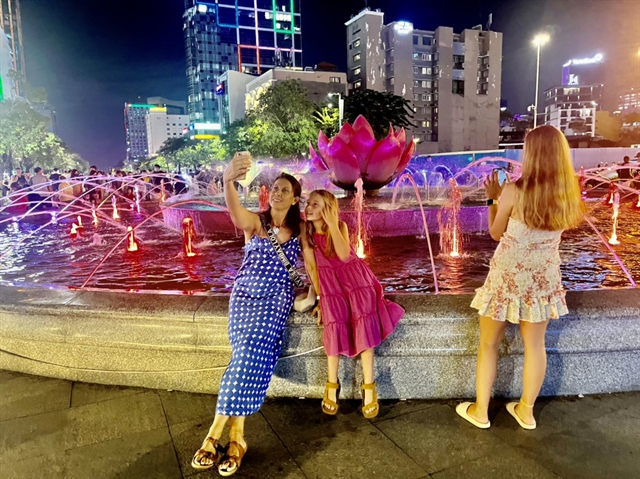 |
| Foreign tourists take a photo at Nguyễn Huệ pedestrian-friendly street in downtown HCM City. VNS Photo Bồ Xuân Hiệp |
However, the fact is that international tourists’ spending in Việt Nam is lower than that in Thailand, according to the Việt Nam National Administration of Tourism.
While a foreign visitor will spend US$163 per day for a total of nine days in Thailand, the figure is only $96 in Việt Nam.
According to most foreign tourists, current night tourism products in HCM City mostly serve domestic tourists. Foreigners mostly eat and drink beer at night, because their options are limited, unlike in other places where the nighttime economy thrives.
For example, Taiwan has hundreds of night markets, and tourists visit different night markets every night since they are all unique. While HCM City is a popular tourist attraction, there is no ‘proper night market’ here, only a few food markets.
Vendors at night markets usually close at 11pm, even though they are allowed to remain open until 6am the next day.
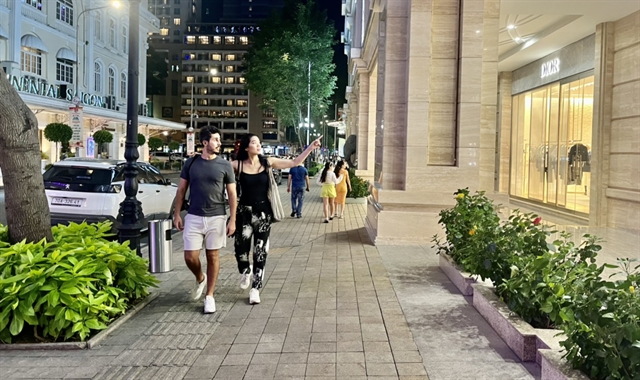 |
| Foreign tourists walk along Đồng Khởi Street in central HCM City. VNS Photo Bồ Xuân Hiệp |
These markets currently serve mostly domestic customers and only a minimal number of foreign tourists.
Nguyễn Ngọc An, deputy general director of Fiditour – Vietluxtour Tourism Company, said night markets were crucial for enticing tourists to stay longer and spend more.
“Many other countries like Thailand, Malaysia and Singapore have been developing great night tourism products that many Vietnamese tourists enjoy. We can learn from them and develop our own regional nighttime economic models,” she said.
Solutions
Nguyễn Thị Ánh Hoa, director of the city's Department of Tourism, said the city sought to create a favourable environment for the tourism community to thrive, supporting tourism start-ups, and promoting alliances between businesses to increase the competitive advantages of tourism products.
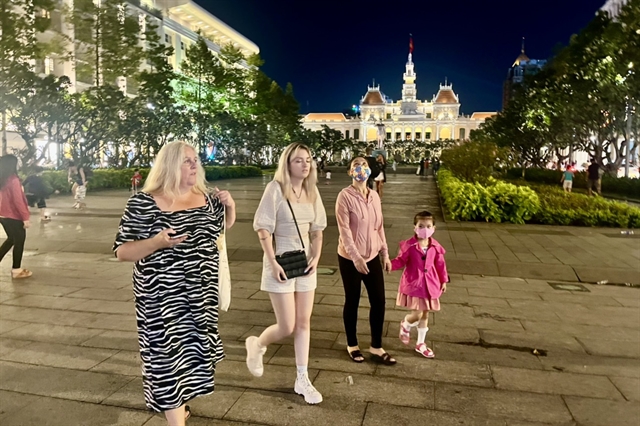 |
| Foreign tourists walk along Nguyễn Huệ pedestrian-friendly street in central HCM City. VNS Photo Bồ Xuân Hiệp |
The department would focus on cultural-historical tourism, culinary tourism and shopping tourism, she added.
HCM City recently announced plans to make 22 downtown streets off-limits to vehicles over the next three years to make them pedestrian-friendly and promote tourism.
Trần Thị Bảo Thu, marketing and communication director of Fiditour, said the plan would promote tourism, including eateries, musical activities and outdoor festivals.
In a city where even pavements in the downtown area are dominated by motorcycles, a proper walking space, free of motorbikes, would be a welcome development for tourists, according to Thu.
The Government has also approved a scheme to develop the nighttime economy in Việt Nam to allow some activities to run overnight until 6am the next day in major tourism cities, including HCM City, Hà Nội and Đà Nẵng.
The plan aims to exploit the potential of the nighttime economy in Việt Nam to promote overall economic growth, improving incomes for residents while limiting risks and negative impacts on political security, social order and safety.
Trần Đình Thiên, former director of the Central Institute for Economic Management, said it was important to carefully study the model for the nighttime economy in Việt Nam.
Tourism promotion for nighttime activities should be enhanced together with building night-time tourism products based on the cultural factors of each locality, he added.
“Security would be a major factor when developing a nighttime economy,” he said.
It required strengthening measures to ensure a safe social security environment with the participation of police in order to avoid drunken disorder, anti-social behaviour and crime, he added.
Public infrastructure must be well developed for the night economy, including social security, traffic and health care systems to improve comprehensive and safe access to nighttime activities.
Lưu Thanh Tâm from HCM City University said it was important to diversify tourism products and services at night, from dining, entertainment and art to shopping.
The Government should consider implementing incentive policies to encourage businesses and households to broaden tourism industry.
A nighttime economy had become a growing trend for cities around the world, contributing to the economic growth of a country. In HCM City, it would provide jobs and bring great economic value.
Top destination
Việt Nam’s domestic tourism continues to revive, with HCM City remaining the top destination for local travel this year, according to a recent study released by online digital travel platform Agoda based on its booking data collated since May.
Visitors’ top activities in the city include sightseeing, mostly of historic sites and museums, and shopping.
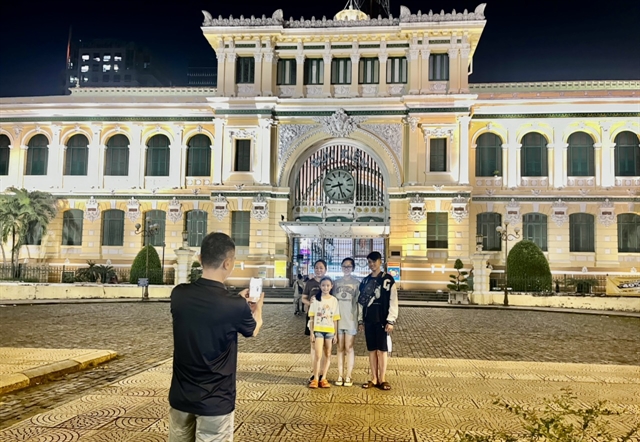 |
| Vietnamese tourists take a photo in front of the HCM City Post Office. VNS Photo Bồ Xuân Hiệp |
The city received the highest number of tourists in the first seven months, welcoming 13.3 million domestic visitors, up 71.7 per cent over the same period last year, and around 765,600 international tourists, according to the National Administration of Tourism.
The city’s total tourism revenue was estimated at $2.58 billion in the period, up 30 per cent and meeting nearly 75 per cent of the full-year target.
Experts said the night-time economy could contribute up to 70 per cent to the country’s tourism revenue.
It would also help encourage tourists to spend more time and money in HCM City, instead of seeing it only as a transit destination.
Việt Nam aims to serve 65 million tourists this year, including about 5 million international visitors. — VNS

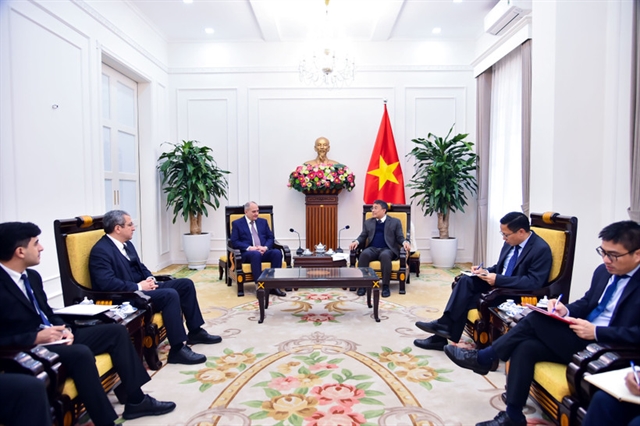
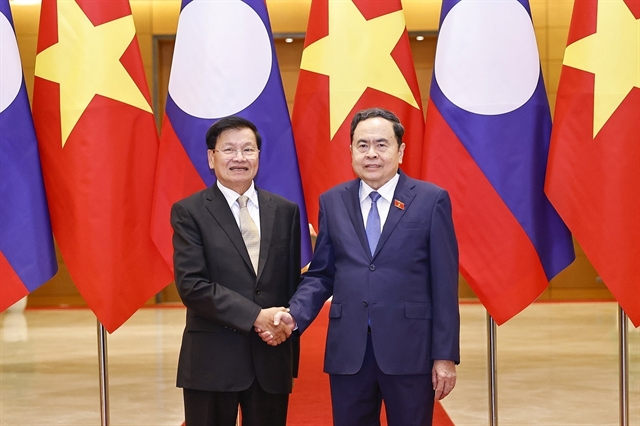


 Brandinfo
Brandinfo